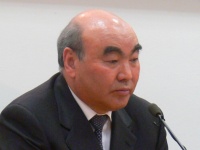Registration
You will receive an email confirming your registration.
IMGXYZ2425IMGZYXThe regime of Kyrgyzstan President Kurmanbek Bakiyev – recently overthrown by a coup – was “repressive and criminal,” according to former Kyrgyz president Askar Akayev, speaking at the Carnegie Moscow Center at an event chaired by Alexey Malashenko. In the wake of Bakiyev’s resignation, Akayev noted that Kyrgyzstan now has its last chance to avoid becoming a failed state.
Akayev – who was himself overthrown by Bakiyev in the so-called “Tulip Revolution” – stated that the recent coup was a classic example of a popular uprising caused by poor living conditions and discontent with Bakiyev’s policies. Foreign forces, he asserted, had no involvement in the events.
Bakiyev’s regime
Akayev’s explained that, since becoming president in 2005, Bakiyev had established a regime characterized by personal power. He used repressive measures to clear the opposition from the political stage, suppress democracy, misappropriate state-owned enterprises, and launch hostile takeovers of small and medium-sized businesses. He worked to marginalize the opposition and place power in the hands of the Bakiyev family clan.
Over his years in power, Akayev argued, Bakiyev attempted to codify authoritarianism and the transfer of power by inheritance in the country’s laws. This would have guaranteed that the presidency would eventually end up in the hands of his son, Maxim Bakiyev, who controlled Kyrgyzstan’s economy.
Can Bakiyev come back?
In Akayev’s opinion, Bakiyev is unlikely to secure the support of neighboring states. They have grown wary of his “bellwether” approach to diplomacy, which worsened Kyrgyzstan’s relations with other countries and caused a loss of trust.
Kyrgyzstan’s new government and the country’s future
The interim government includes a number of experienced politicians, some of them prominent since the 1990s, such as Roza Otunbayeva, who is now chair of the provisional government, Omurbek Tekebayev and Temir Sariyev. Akayev noted that the interim government has listened to the voice of the public, citing its relations with Russia as an example.
In Akayev’s view, Kyrgyzstan must take the following steps to return rule of law to the country:
- First, adopt a new constitution and hold free democratic elections. This would open the way for a new generation of young politicians and economists who were denied entry under Bakiyev.
- Second, re-nationalize those economic facilities that were privatized through corruption, in order to re-privatize them in a transparent, legal manner.
